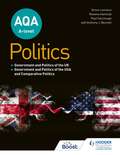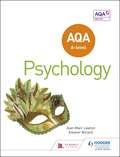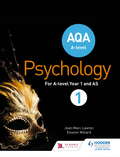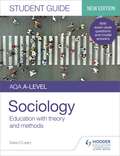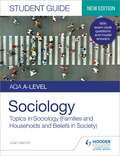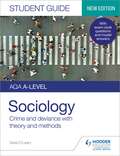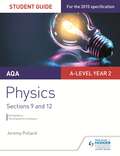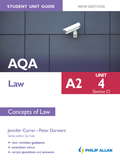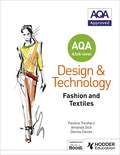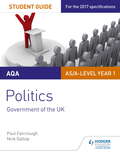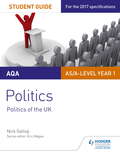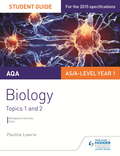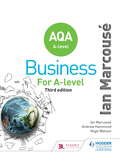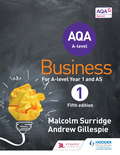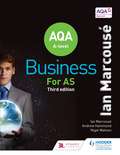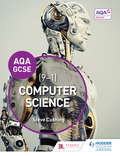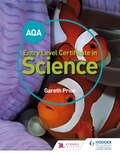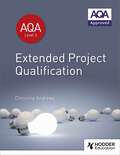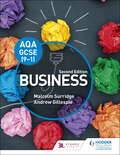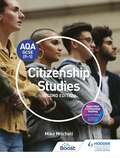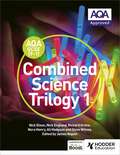- Table View
- List View
AQA A-level Politics: Government and Politics of the UK, Government and Politics of the USA and Comparative Politics
by Simon Lemieux Anthony J Bennett Paul Fairclough Rowena HammalPacked with insight into contemporary issues and analysis of the latest developments in UK and US Politics, including the 2019 UK General Election and 2020 US election, this textbook is specially designed to help your students perform to the best of their abilities in the AQA Politics Paper 1 and Paper 2 exams. This Student Textbook:- Strengthens your students' understanding of comparative politics through dedicated comparative politics chapters and synoptic links throughout- Builds your students' confidence by highlighting key terms and connections between different topics in the specification- Develops your students' skills of analysis and evaluation through activities, debates and exam-style questions- Provides answer guidance for exam-style questions online at www.hoddereducation.co.uk
AQA A-level Psychology (Year 1 and Year 2): Study Skills And Revision Updf
by Eleanor Willard Jean-Marc LawtonEquip your students with the knowledge and skills to study for AQA A-level Psychology with clear, comprehensive coverage, guidance on assessment objectives and updated practice questions that consolidate understanding, develop evaluative skills and ensure progression.This all-in-one textbook covers the Year 1 and Year 2 specifications.- Engage your students through extensive real-life contemporary research, including evaluation points at the end of each research section to develop their analytical skills.- Test knowledge and support exam preparation with updated practice questions, based on past assessments.- Ensure progression and encourage independent thinking with extension suggestions and activities.- Help your students understand the assessment objectives and develop their examination skills with assessment guidance throughout.- Ensure students learn and understand content for all the key topics with the clear, accessible style, written by Jean-Marc Lawton and Eleanor Willard.Please note: The following topics will not be included in the printed book but will be available to download online as part of your purchase: addiction, cognition and development, eating behaviour.
AQA A-level Psychology Book 2
by Eleanor Willard Jean-Marc LawtonEquip your students with the knowledge and the skills that they need for the new AQA Psychology A-level, with guidance on assessment objectives, clear, comprehensive coverage and activities that consolidate understanding, develop key skills and ensure progression. - Thoroughly engage your students with Psychology at A-level through extensive real-life contemporary research - Ensure students learn and understand content for all the key topics with popular clear, accessible style from Jean-Marc Lawton and Eleanor Willard - Helps your students understand the assessment objectives and develop their examination skills with assessment guidance and checks throughout and practice questions - Ensures progression and encourages independent thinking with extension suggestions and activities
AQA A-level Sociology Student Guide 1: Education with theory and methods
by Dave O'LearyReinforce understanding of the content examined in A-level Paper 1: Education with Theory and Methods, including Education, Methods in context, and Theory and methods.Packed full of clear topic summaries, knowledge check questions and sample exam-style questions and answers with commentaries, this guide will help students aim for and achieve the highest grades.This Student Guide will help to:- Identify key content for the exams with our concise coverage of topics- Avoid common pitfalls with clear definitions and exam tips throughout- Reinforce learning with bullet-list summaries at the end of each section- Test knowledge with rapid-fire knowledge check questions and answers- Find out what examiners are looking for with our Questions & Answers section
AQA A-level Sociology Student Guide 2: Topics in Sociology (Families and households and Beliefs in society)
by Laura Pountney Joan GarrodReinforce understanding of the two most popular options for A-level Paper 2: Topics in Sociology, including Families and Households, and Beliefs in Society.Packed full of clear topic summaries, knowledge check questions and sample exam-style questions and answers with commentaries, this guide will help students aim for and achieve the highest grades.This Student Guide will help to:- Identify key content for the exams with our concise coverage of topics- Avoid common pitfalls with clear definitions and exam tips throughout- Reinforce learning with bullet-list summaries at the end of each section- Test knowledge with rapid-fire knowledge check questions and answers- Find out what examiners are looking for with our Questions & Answers section
AQA A-level Sociology Student Guide 3: Crime and deviance with theory and methods
by Dave O'LearyReinforce understanding of the content examined in A-level Paper 3: Crime and deviance with Theory and methods.Packed full of clear topic summaries, knowledge check questions and sample exam-style questions and answers with commentaries, this guide will help students aim for and achieve the highest grades.This Student Guide will help to:- Identify key content for the exams with our concise coverage of topics- Avoid common pitfalls with clear definitions and exam tips throughout- Reinforce learning with bullet-list summaries at the end of each section- Test knowledge with rapid-fire knowledge check questions and answers - Find out what examiners are looking for with our Questions & Answers section
AQA A-level Spanish (includes AS)
by Mike Thacker Tony Weston José García SánchezOur Student Book has been approved by AQA.Support the transition from GCSE and through the new A-level specification with a single textbook that has clear progression through four defined stages of learning suitable for a range of abilities.We have developed a completely new textbook designed specifically to meet the demands of the new 2016 specification. The Student Book covers both AS and A-level in one textbook to help students build on and develop their language skills as they progress throughout the course. - Exposes students to authentic target language material with topical stimulus, and film and literature tasters for every work- Supports the transition from GCSE with clear progression through four stages of learning: transition, AS, A-level and extension- Builds grammar and translation skills with topic-related practice and a comprehensive grammar reference section- Develops language skills with a variety of tasks, practice questions and research activities- Gives students the tools they need to succeed with learning strategies throughout - Prepares students for the assessment with advice on essay-writing and the new individual research projectAudio resources to accompany the Student Book can be purchased in several ways: 1) as part of the Dynamic Learning Teaching and Learning resource, 2) downloaded separately, 3) as part of the Student eTextbook. The audio resources are not part of the AQA approval process.
AQA A-level Year 2 Physics Student Guide: Sections 9 and 12
by Jeremy PollardWritten by experienced author Jeremy Pollard, this Student Guide for Physics:-Identifies the key content you need to know with a concise summary of topics examined in the A-level specifications-Enables you to measure your understanding with exam tips and knowledge check questions, with answers at the end of the guide-Helps you to improve your exam technique with sample answers to exam-style questions-Develops your independent learning skills with content you can use for further study and research
AQA A2 Law Student Unit Guide New Edition: Unit 4 (Section C) Concepts of Law
by Peter Darwent Jennifer CurrerWritten by senior examiners, Jennifer Currer and Peter Darwent, this AQA A2 Law Student Unit Guide is the essential study companion for Unit 4: Concepts of Law.This full-colour book includes all you need to know to prepare for your unit exam: clear guidance on the content of the unit, with topic summaries, knowledge check questions and a quick-reference index examiner's advice throughout, so you will know what to expect in the exam and will be able to demonstrate the skills required exam-style questions, with graded student responses, so you can see clearly what is required to get a better grade
AQA AS/A-Level Design and Technology: Fashion and Textiles
by Amanda Dick Pauline Treuherz Denise DaviesExam board: AQALevel: A-levelSubject: Design and TechnologyFirst teaching: September 2017First exams: Summer 2018 (AS) Summer 2019 (A-Level)Encourage your students to be creative, innovative and critical designers with a textbook that builds in-depth knowledge and understanding of the materials, components and processes associated with the creation of fashion and textile products.Our experienced author team will help guide you through the requirements of the specification, covering the core technical and designing and making principles needed for the 2017 AQA AS and A-level Design and Technology Fashion and Textiles specification.- Explores real-world contexts for fashion and textiles- Develops practical skills and theoretical knowledge and builds student confidence- Supports students with the application of maths skills to fashion and textiles- Helps guide students through the requirements of the Non-Exam Assessments and the written exams at both AS and A-level
AQA AS/A-Level Design and Technology: Product Design
by Will Potts Julia Morrison Ian Granger Dave SumpnerExam Board: AQALevel: AS/A-levelSubject: Design & TechnologyFirst Teaching: September 2017First Exam: June 2018Encourage your students to be creative, innovative and critical designers with a textbook that builds in-depth knowledge and understanding of the materials, components and processes associated with the creation of products.Our expert author team will help guide you through the requirements of the specification, covering the core technical and designing and making principles needed for the 2017 AQA AS and A-level Design and Technology Product Design specification.- Explores real-world contexts for product design- Develops practical skills and theoretical knowledge and builds student confidence- Supports students with the application of maths skills to design and technology - Helps guide students through the requirements of the Non-Exam Assessments and the written exams at both AS and A Level.
AQA AS/A-level Politics Student Guide 1: Government of the UK
by Paul Fairclough Nick GallopReinforce your understanding throughout the course. Clear topic summaries with sample questions and answers will help you improve your exam technique to achieve higher grades.Written by experienced teachers Nick Gallop and Paul Fairclough, this Student Guide for Politics:-Identifies the key content you need to know with a concise summary of topics examined in the AS/A-level specifications-Enables you to measure your understanding with exam tips and knowledge check questions, with answers at the end of the guide-Helps you to improve your exam technique with sample answers to exam-style questions-Develops your independent learning skills with content you can use for further study and research
AQA AS/A-level Politics Student Guide 2: Politics of the UK
by Nick GallopWritten by experienced teachers Nick Gallop and Paul Fairclough, this Student Guide for Politics:-Identifies the key content you need to know with a concise summary of topics examined in the AS/A-level specifications-Enables you to measure your understanding with exam tips and knowledge check questions, with answers at the end of the guide-Helps you to improve your exam technique with sample answers to exam-style questions-Develops your independent learning skills with content you can use for further study and research
AQA Biology Student Guide 1: Topics 1 and 2
by Pauline LowrieWritten by experienced teacher Pauline Lowrie, this Student Guide for Biology:- Helps students identify what they need to know with a concise summary of the topics examined in the AS and A-level specifications- Consolidates understanding with tips and knowledge check questions- Provides opportunities to improve exam technique with sample answers to exam-style questions- Develops independent learning and research skills- Provides the content for generating individual revision notes
AQA Business for A Level (Marcousé)
by Ian Marcouse Nigel Watson Andrew HammondIan Marcousé has been trusted by Business students for over 15 years and his updated textbook has been fully revised to reflect the 2015 AQA Business specification, giving you up-to-date material that supports your teaching and student's learning.- Guides students through the content in an easy to understand way, with the new 'logic chain' feature at the start of every chapter showing them the progression clearly- Helps students apply their knowledge and analyse business data with real business examples throughout- Consolidates students' learning and prepares them for assessment with the workbook feature at the end of every chapter containing knowledge check and practice questions
AQA Business for A Level 1 (Surridge & Gillespie)
by Malcolm Surridge Andrew GillespieExam Board: AQALevel: AS/A-levelSubject: BusinessFirst Teaching: September 2015First Exam: June 2016Surridge and Gillespie are back, helping students of all abilities reach their goal; develop students' quantitative and analytical skills, knowledge and ability to apply theoretical understanding through real life business examples and varied activities.This textbook has been fully revised to reflect the 2015 AQA Business specification, giving you up-to-date material that supports your teaching and student's learning.- Builds up quantitative skills with 'Maths moment' features and assesses them in the end of chapter activities - Ensures students have the knowledge of real life businesses so they can apply their theoretical understanding with the 'Business in focus' feature- Helps students get to grips with the content and tests key skills with activities at the end of every chapter
AQA Business for AS (Marcousé)
by Ian Marcouse Nigel Watson Andrew HammondDevelop understanding of business arguments and reasoning, with a clear progression pathway and case studies that illustrate core points.Ian Marcouse has been trusted by Business students for over 15 years and his updated textbook has been fully revised to reflect the 2015 AQA Business specification, giving you up-to-date material that supports your teaching and student's learning.- Guides students through the content in an easy to understand way, with the new 'logic chain' feature at the start of every chapter showing them the progression clearly- Helps students apply their knowledge and analyse business data with real business examples throughout- Consolidates students' learning and prepares them for assessment with the workbook feature at the end of every chapter containing knowledge check and practice questions
AQA Computer Science for GCSE Student Book
by Steve CushingBuild student confidence and ensure successful progress through GCSE Computer Science. Our expert authors provide insight and guidance to meet the demands of the new AQA specification, with challenging tasks and activities to test the computational skills and knowledge required for success in their exams, and advice for successful completion of the non-examined assessment.- Builds students' knowledge and confidence through detailed topic coverage and explanation of key terms- Develops computational thinking skills with practice exercises and problem-solving tasks- Ensures progression through GCSE with regular assessment questions, that can be developed with supporting Dynamic Learning digital resources- Instils a deeper understanding and awareness of computer science, and its applications and implications in the wider world
AQA Entry Level Certificate in Science Student Book
by Gareth PriceInspire students to progress with this fresh and contemporary take on Science, brought to life through clear explanations and real-world examples that are tailored to the new AQA Entry Level Certificate in Science specification requirements.- Provides you with a very different sort of textbook to help engage students who are disillusioned or struggling with their science study; full of relevant contexts, exciting photographs and a sense of fun.- Offers activities that will demonstrate students' understanding in a variety of ways, from factual recall and enquiry skills, to group discussion and creative/artistic tasks.- Created to support students with lower literacy levels.- Provides comprehensive support for non-specialist or less-confident teachers when used in conjunction with the online Teaching & Learning resources.- Offers flexibility to use with either Entry Level students or as a support resources for Foundation-tier GCSE Combined Science candidates.
AQA Extended Project Qualification (EPQ)
by Christine AndrewsWorking independently does not mean going it alone: be guided through the Extended Project from start to finish and every stage in between.Written by Christine Andrews, who has extensive experience of EPQs, this step-by-step course companion will help you to:- Tackle every stage, including choosing a topic and planning your time, developing your project and keeping a log, and delivering the presentation and evaluating your finished product.- Make the most of opportunities to practise the skills required, with activities you can adapt as necessary.- Get inspired with a wealth of examples from different types of projects.- Develop effective strategies to avoid common pitfalls.- Create a project you can be proud of - one you can use in your personal statement, to make your university application stand out.Also available are PowerPoint presentations and a scheme of work put together by the author to facilitate the 30 hours of taught content. The presentation and scheme of work are not part of the AQA approval process.
AQA GCSE (9-1) Biology Student Book
by Nick Dixon Ali HodgsonExam Board: AQALevel: GCSESubject: BiologyFirst Teaching: September 2016First Exam: June 2018AQA approved.Develop your students' scientific thinking and practical skills within a more rigorous curriculum; differentiated practice questions, progress tracking, mathematical support and assessment preparation will consolidate understanding and develop key skills to ensure progression.- Builds scientific thinking, analysis and evaluation skills with dedicated Working Scientifically tasks and support for the 8 required practicals, along with extra activities for broader learning- Supports students of all abilities with plenty of scaffolded and differentiated Test Yourself Questions, Show You Can challenges, Chapter review Questions and synoptic practice Questions- Supports Foundation and Higher tier students, with Higher tier-only content clearly marked- Builds Literacy skills for the new specification with key words highlighted and practice extended answer writing and spelling/vocabulary testsFREE GCSE SCIENCE TEACHER GUIDESThese will be provided for free via our website. To request your free copies please email science@hodder.co.uk
AQA GCSE (9-1) Business
by Malcolm Surridge Andrew GillespieSelected for an AQA approval processBenefit from the expert guidance of Surridge and Gillespie; this new edition of their well-known Student Book provides up-to-date content, real business examples and assessment preparation materials that help every student achieve their best in the 2017 specification. Builds understanding of business concepts through accessible explanations, supported by definitions of key terms and tips that highlight important points and common misconceptions. Enables students to apply their knowledge to real business examples, issues and contexts in the 'Business insight' feature. Develops investigative, analytical and evaluation skills through multiple choice, short answer and case study/data response questions, sample answers and commentary. Encourages students to track their progress using learning outcomes, end-of-chapter summaries and knowledge-check questions. Helps students practise and improve their quantitative skills via the 'Maths moment' feature. Stretches students with questions that test their ability to make an informed judgement.
AQA GCSE (9-1) Chemistry Student Book
by Nora Henry Richard GrimeExam Board: AQALevel: GCSESubject: ChemistryFirst Teaching: September 2016First Exam: June 2018AQA approved.Expand and challenge your students' knowledge and understanding of Chemistry with this textbook that guides students through each topic, the 8 required practical activities and assessment requirements of the new 2016 AQA GCSE Chemistry specification.- Provides support for all 8 required practicals, along with extra tasks for broader learning- Tests understanding and consolidate learning with Test Yourself questions, Show you Can challenges, Chapter review questions and synoptic practice questions- Supports Foundation and Higher tier students, with Higher tier-only content clearly marked- Builds Literacy skills for the new specification with key words highlighted and practice extended answer writing and spelling/vocabulary testsFREE GCSE SCIENCE TEACHER GUIDESThese will be provided for free via our website. To request your free copies please email science@hodder.co.uk
AQA GCSE (9-1) Citizenship Studies Second Edition
by Mike MitchellEncourage students to take an active role in citizenship with fully updated content that will allow them to understand the key issues and concepts they need to know using clear, detailed explanations of key terms, supported by real-life case studies that will bring the topic to life. This book contains:- Extensive coverage of tricky topics so students can avoid common mistakes - Up-to-date case studies covering all recent developments relevant to the course - Activities and discussion points, review questions and learning points that teach students the research, analytical, interpretative and evaluative skills required - Fully revised exam-style questions throughout the book, as well as assessment guidance and useful advice on writing exam answers - Links to relevant websites to allow further subject enrichment
AQA GCSE (9-1) Combined Science Trilogy Student Book 1
by Nick England Nora Henry Nick Dixon Richard Grime Steve Witney Ali HodgsonExam Board: AQALevel: GCSESubject: ScienceFirst Teaching: September 2016First Exam: June 2018AQA approved.Build your students' scientific thinking, analysis and evaluation with this textbook that leads them seamlessly from basic concepts to more complicated theories, with topical examples, practical activities and mathematical support throughout.Developed specifically for the 2016 AQA GCSE Combined Science Trilogy specification.-Builds experimental, analytical and evaluation skills with activities that introduce the 16 required practicals, along with extra Working Scientifically tasks for broader learning-Provides plenty of opportunity for students to apply their knowledge and understanding with Test Yourself questions, Show You Can challenges, Chapter review questions and synoptic practice questions-Supports Foundation and Higher tier students in one book, with Higher tier-only content clearly marked.Book 1 covers the topics in Biology Paper 1, Chemistry Paper 1 and Physics Paper 1FREE GCSE SCIENCE TEACHER GUIDESThese will be provided for free via our website. Biology will be available in OctoberChemistry will be available in JanuaryPhysics will be available in MarchTo request your free copies please email science@hodder.co.uk
